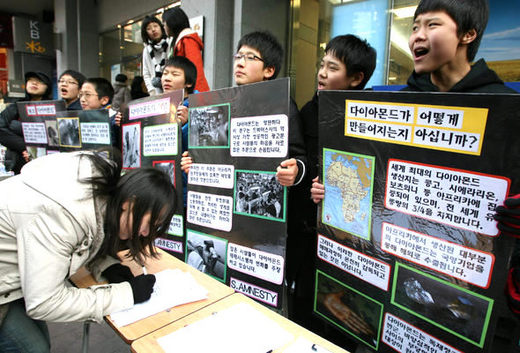 |
|
A group of middle schoolers holds a street campaign in down town Seoul on January 11.
|
Students, activists join hands to expose harsh reality of diamond business
"I heard that people from rich countries buy diamonds cheaply in Africa and then resell them at really high prices," said Kim Min-gyu, a first-year middle school student in Gwacheon, Gyeonggi Province. "I am so unhappy about this reality," she kept repeating. Kim, along with more than 30 middle school students and members of "Amnesty," a student group from Sookmyung Women’s University, held a street campaign in front of the UNESCO building in downtown Seoul on January 11 "to try to bring help to Africa, where various human rights violations persist, such as exploitation of labor, child labor, and war, surrounding the acquisition of natural resources like diamonds," according to one organizer. The protestors were inspired by the U.S. film "Blood Diamond," which was released on the same day. The movie tells the tragic story of a boy soldier who had been enlisted in the military for a civil war in Sierra Leone in 1999, and who ended up facing his own father in battle. Jeon Gyeong-ok, a professor at Sookmyung Women’s University who led the campaign, explained, "Boy soldiers and wars in Africa began from dirty, illegal business surrounding diamonds, which are a symbol of wealth. African warlords mine the rough diamonds and sell them to buy weapons, which in turn bring about war, massacres, and human rights abuses," she added.The Korea branch of Amnesty International, an international human rights watchdog, issued a statement, saying, "In some African nations, diamonds are decisive factors of bloody disputes. Consumers are urged not to buy so-called ‘dispute diamonds,’ which bring about human rights violations and war." According to the United Nations in October last year, the diamonds which were mined by armed organizations in the Ivory Coast and then distributed after being disguised as ‘non-dispute diamonds’ amounted to sales of US$23 million. Over 3.7 million people have died in disputes which took place in four African nations - Angola, the Democratic Republic of Congo, Sierra Leone, and Libya - since the late 1990s. Diamonds mined in these countries accounted for about 15 percent of the diamonds traded in the world during the same period. The international community and human rights organizations have made efforts to correct the problem for the past few years. The U.N. general assembly adopted a resolution in December 2002 urging related nations to introduce an international certificate system for rough diamonds to prevent armed organizations from earning profits by exchanging diamonds for weapons in war-torn regions. Based on this proposal, the Kimberley Process Certification Scheme, an international treaty on diamond transactions, took effect in January 2003. This treaty is aimed at stopping the distribution of diamonds produced in disputed regions by necessitating a confirmed certificate of origin for rough diamonds. Over 70 nations, including South Korea, have joined the agreement. The U.S. drafted a similar "clean diamond transaction law" in 2003. In South Korea, however, the international treaty exists in name only. An owner of a jewelry shop in Jongno, downtown Seoul, said, "I’ve never heard of the Kimberley Process. Sometimes, there are persons who come here to sell rough diamonds, but I have never confirmed the diamonds’ origin." A clerk at a nearby store said, "In the case of already-cut jewels, there bear no record of their origin; therefore, we have no idea whether or not they are ‘dispute diamonds.’ " It is the same case when it comes to citizens in general. Seo Chae-hi, 31, a resident of Gangwon Province who was visiting a shop to buy a wedding ring, said, "I didn’t know there were regulations in place about the origins of diamonds. When I buy a diamond, I only check its shape and color, as well as how delicately it is cut. I was not interested in its origin." Please direct questions or comments to [englishhani@hani.co.kr]





